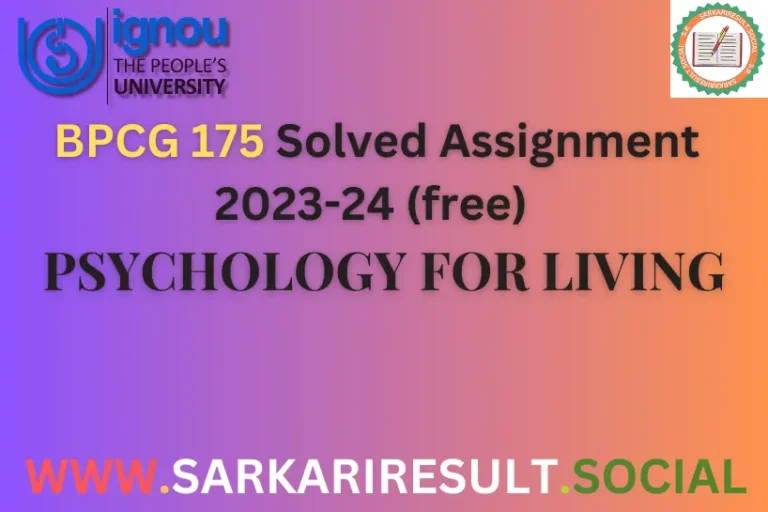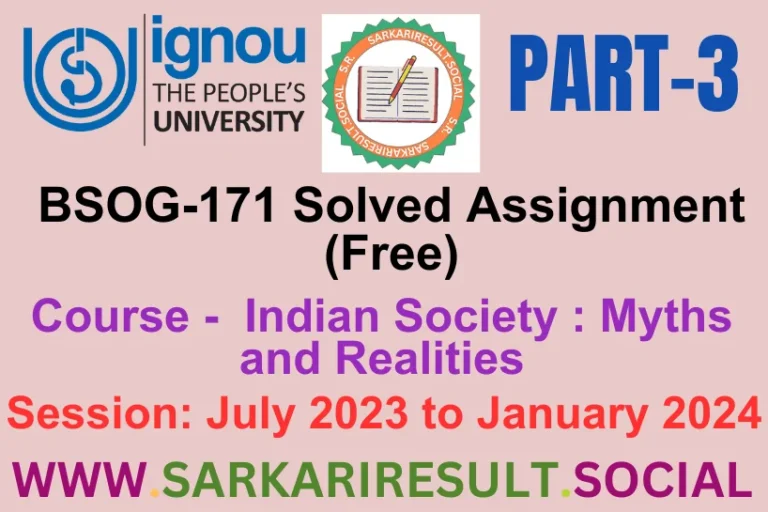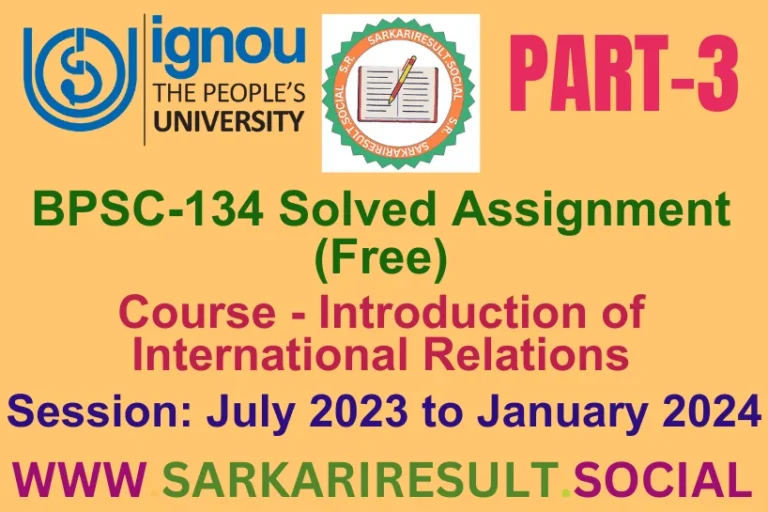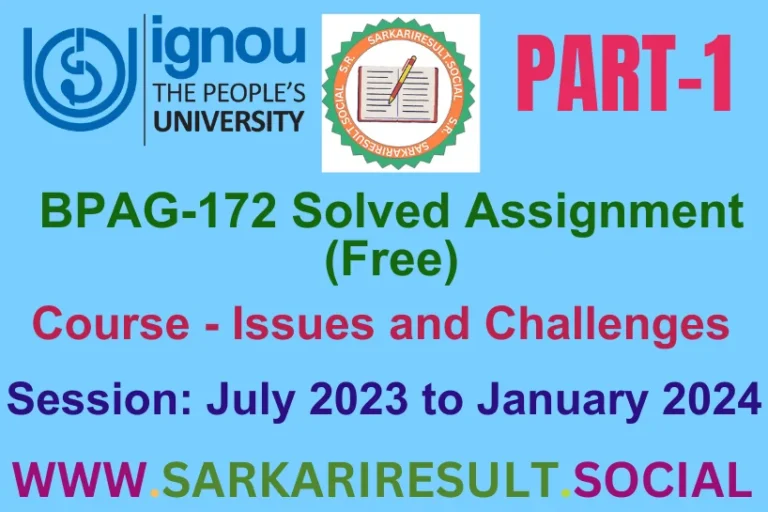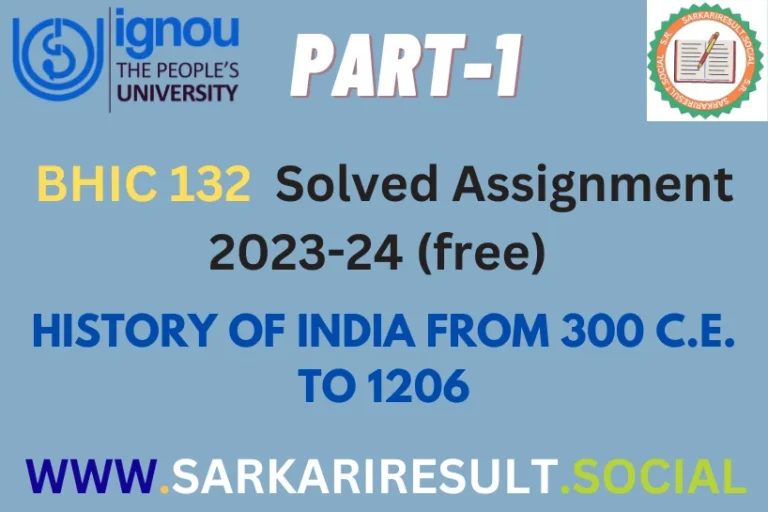BABG 171 SOLVED IGNOU ASSIGNMENT FREE PART 1
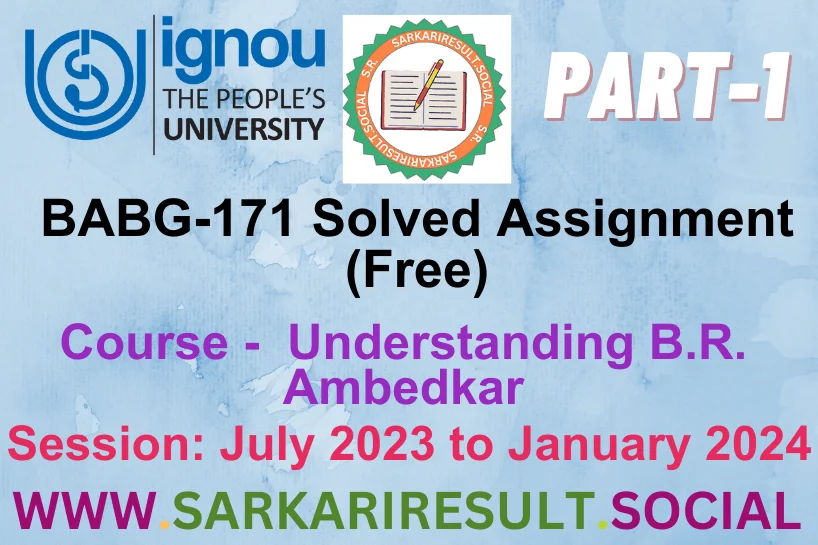
Dive into Assignment-I of BABG 171 SOLVED IGNOU ASSIGNMENT FREE PART 1: Understanding B.R. Ambedkar with our meticulously crafted IGNOU Solved Assignments 2024. Explore Ambedkar’s profound ideas on nation-building and his visionary solutions for fostering a casteless society in India. Your journey through this assignment involves delving into these critical questions, each to be answered with depth and clarity in approximately 500 words. Elevate your comprehension and secure success with our comprehensive guide.

Answer the following in about 500 words each.
Q.1 Discuss Ambedkar’s idea on nation building.
Ans. Dr. B.R. Ambedkar, an eminent jurist, social reformer, and the principal architect of the Indian Constitution, had profound and visionary ideas on nation-building. His thoughts were deeply rooted in the principles of justice, equality, and empowerment of marginalized sections of society. Here are key aspects of Ambedkar’s ideas on nation-building:
1. Social Justice as the Foundation:- Ambedkar emphasized that true nation-building could only occur when there is social justice. He argued that the caste system, which had deeply entrenched hierarchies and discrimination, needed to be dismantled for the creation of a just and egalitarian society. He advocated for the annihilation of caste to ensure equal opportunities for all citizens.
2. Equality and Rights:- Ambedkar stressed the importance of equality in the nation-building process. He was a champion of the rights of Dalits, the oppressed caste groups, and other marginalized communities. He believed that political democracy alone was insufficient; social and economic democracy were equally vital. Ambedkar’s vision included affirmative action and reservation policies to uplift those historically disadvantaged.
3. Education as Empowerment:- Education held a special place in Ambedkar’s vision. He considered education as a powerful tool for empowerment and advocated for widespread education, particularly for the marginalized sections. Ambedkar believed that education could break the chains of social discrimination and empower individuals to contribute meaningfully to nation-building.
4. Political Empowerment:- Ambedkar was a strong proponent of political empowerment for the oppressed. He played a crucial role in ensuring that the Indian Constitution guaranteed political rights and representation for Dalits and other marginalized communities. He believed that political power was essential for shaping policies that address the concerns of the downtrodden.
5. Economic Justice:- Economic justice was integral to Ambedkar’s vision. He highlighted the need for economic reforms to uplift the socially and economically disadvantaged. Ambedkar’s emphasis on economic justice was not only about poverty alleviation but also about ensuring that marginalized communities have access to economic opportunities and resources.
6. Dignity and Self-Respect:- Ambedkar underscored the significance of dignity and self-respect for all citizens. He argued that the denial of dignity to any section of society hinders the development of a robust and united nation. Ambedkar’s idea of nation-building included fostering an environment where every individual, regardless of caste or background, could live with dignity.
7. Constitutional Morality:- Ambedkar played a pivotal role in drafting the Indian Constitution. He believed that the Constitution would serve as a guiding document for the nation, ensuring justice, liberty, and equality. Ambedkar’s idea of constitutional morality emphasized adherence to the principles laid down in the Constitution, promoting a just and inclusive society.
8. Secularism:- Ambedkar envisioned a secular India where people of all religions coexist harmoniously. He saw secularism as a fundamental principle for nation-building, ensuring that the state would not favor any particular religion and that citizens could freely practice their faith.
9. International Solidarity:- While focusing on the nation-building process, Ambedkar recognized the importance of global cooperation. He believed in the principles of justice and liberty at a global level and emphasized India’s role in contributing to international peace and cooperation.
Dr. B.R. Ambedkar’s ideas on nation building were revolutionary and aimed at creating a society that transcends caste, class, and religious divides. His vision of a just, equal, and democratic India laid the foundation for the nation’s commitment to social justice and inclusivity. Ambedkar’s ideas continue to influence the social and political landscape of India, shaping the ongoing journey of nation-building.
Q.2 What solutions does Ambedkar offer for a casteless society in India? Explain.
Ans. Dr. B.R. Ambedkar, a prominent social reformer and the chief architect of the Indian Constitution, dedicated his life to advocating for the annihilation of caste and the creation of a casteless society. His solutions for achieving this radical transformation were deeply rooted in principles of social justice, equality, and empowerment. Here are some key solutions proposed by Ambedkar:
1. Annihilation of Caste:- Ambedkar’s seminal work “Annihilation of Caste” is a powerful critique of the caste system and a call for its complete elimination. He argued that the caste system was a major obstacle to the progress and unity of Indian society. Ambedkar proposed annihilating the caste system through a radical restructuring of social relationships, emphasizing inter-caste marriages and the breaking down of barriers that perpetuate caste distinctions.
2. Educational Empowerment:- Ambedkar believed that education was a key instrument for the annihilation of caste. He advocated for widespread and quality education, especially for the Dalits and other marginalized sections. Education, in Ambedkar’s vision, had the potential to empower individuals, challenge traditional norms, and break the cycle of discrimination associated with caste.
3. Reservation Policies:- Ambedkar played a pivotal role in introducing reservation policies in the Indian Constitution. He argued that affirmative action was necessary to uplift the socially and economically disadvantaged sections, particularly the Scheduled Castes (SCs) and Scheduled Tribes (STs). Reservation in educational institutions, government jobs, and political representation was seen as a temporary but essential measure to address historical injustices.
4. Political Empowerment:- Ambedkar stressed the need for political empowerment of the marginalized communities. He was instrumental in ensuring adequate political representation for Dalits in the Constitution. He believed that political power was essential for shaping policies that address the concerns of the downtrodden and for challenging the deeply ingrained caste-based discrimination.
5. Economic Reforms:- Economic empowerment was a crucial aspect of Ambedkar’s strategy for a casteless society. He advocated for economic reforms that aimed at improving the economic conditions of Dalits and other marginalized groups. Land redistribution, access to resources, and economic opportunities were key components of his vision for economic justice.
6. Social and Inter-Caste Marriages:- Ambedkar encouraged social and inter-caste marriages as a means to break the barriers of caste segregation. He believed that such marriages would challenge traditional prejudices, promote social integration, and contribute to the creation of a casteless society. Ambedkar himself set an example by advocating for inter-caste marriage and marrying a Brahmin woman.
7. Destruction of Varna System:- Ambedkar aimed not only at the annihilation of caste but also the destruction of the Varna system, which formed the basis of caste divisions. He called for the eradication of the hierarchical social order and the establishment of a society based on principles of equality and fraternity.
8. Cultural Transformation:- Ambedkar recognized the need for a cultural transformation that challenges age-old discriminatory practices and prejudices. He believed that cultural changes, driven by education and awareness, were essential for building a society where individuals are not judged by their birth but by their merit and character.
9. Legal Safeguards:- Ambedkar, being the chief architect of the Indian Constitution, ensured that legal safeguards were in place to protect the rights of Dalits and other marginalized groups. Legal provisions against untouchability, discrimination, and atrocities were incorporated to provide a framework for ensuring justice and equality.
In summary, Ambedkar’s solutions for a casteless society encompassed a comprehensive approach that addressed educational, economic, political, social, and cultural dimensions. His vision continues to be relevant as India grapples with the persistence of caste-based discrimination, and his ideas remain a guiding force for those advocating for social justice and equality.
Also See This: BABG 171 SOLVED IGNOU ASSIGNMENT FREE PART 2

